Developing AI Infrastructure for LATAM
Latin America is facing unique challenges in the global AI arms race. Prior to our first LatinX in AI Research Workshop at the Neural Information Processing Systems (NeurIPS) Conference in December 2018, the representation of Latin American researchers at these elite conferences was abysmal. In the last 10 years leading up to 2016, there had only been 11 papers accepted at NeurIPS from South America, according to an investigation by the Deep learning Indaba group.
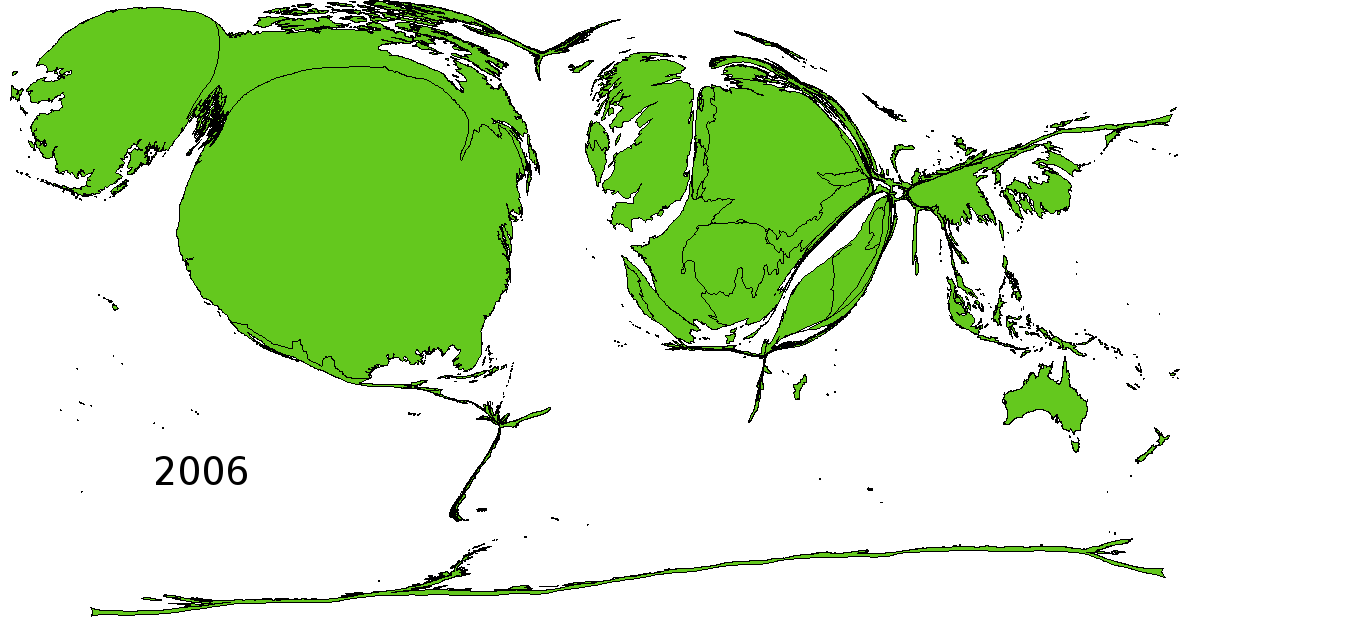
Area cartogram showing countries rescaled in proportion to their accepted NIPS papers for 2006–2016.
For those who aren’t familiar with NeurIPS, it has poised itself to be the fastest growing and most competitive AI conference, projected to have 10,000 submissions this year which crashed it’s submissions site servers and caused a deadline extension this past weekend.
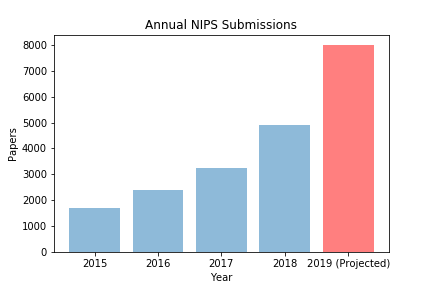
Infographic depicting NIPS submissions over time. The red bar plots fabricated data.
Approximately Correct blog by Zachary P. Lipton
.
It has also been credited with driving up Arxiv submissions for AI and Machine Learning research each year.
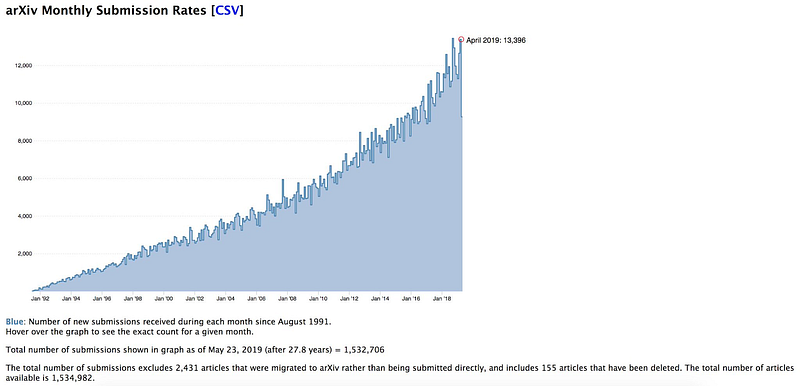
Arxiv submission rates tweeted by Yad Konrad.
“Since last year, ~1000 more papers published on this day. I wonder what it would look like in the next 24 hours after NeurIPS Full paper submission deadline.” tweeted Yad Konrad, a researcher in SF.
These statistics prove that it is critical to ensure that the research showcased at NeurIPS doesn’t just represent the research coming from specific regions, but from around the globe; needless to say, this urgency is not limited to NeurIPS, but also applies to similar conferences and publications. Developing nations are furthering AI and Machine learning technology in ways that can benefit even the most advanced societies. This development will lighten the burden often carried by well-resourced governments to support communities who have lacked access to technological development.
Our next big event is coming up in a week, the Official LXAI Research Workshop is co-located with the Thirty-sixth International Conference on Machine Learning ICML at the Long Beach Convention Center in Long Beach, CA on Monday, June 10th, 2019.
We chose to co-locate an official workshop with ICML, one of the fastest growing artificial intelligence conferences in the world, due to it being globally renowned for presenting and publishing cutting-edge research on all aspects of machine learning used in closely related areas like artificial intelligence, statistics and data science, as well as important application areas such as machine vision, computational biology, speech recognition, and robotics.

LXAI Research @ ICML 2019
This is the first of our workshops completely organized and run by members of our community who have dedicated countless hours over the past six months, meeting weekly and putting together a full day’s schedule including three headlining keynotes, a panel of industry leaders, sponsored luncheon, as well as ten oral presenters and over forty poster presenters selected by a rigorous program committee review process of their submitted research abstracts.
Huge thanks to the Chairs of the LatinX in AI Research Workshop at ICML 2019:
Executive Chair —Elisa Celis, Assistant Professor, Yale University
Operations and Visa Chair — Javier Turek, Research Scientist in ML, Intel Labs
Program Committee Chair — Jorge Luis Guevara Diaz, Research Scientist, IBM Research
Sponsorship and Website Chair — Pablo Rivas, Assistant Professor of Computer Science, Marist College
Finance Chair —Javier Andres Orduz Ducuara, Doctor of Sciences, National Autonomous University of Mexico
Public Relations Chair — Xavier Sumba, Research Assistant, Concordia University
Big thanks to our amazing sponsors:

Sponsors for the LXAI Research Workshop @ ICML 2019
For full details on this event’s programming and registration: http://www.latinxinai.org/icml-2019
We’ll be putting out a call for chairs of our next official workshop at NeurIPS 2019 shortly, please stay tuned to be a part of this amazing community.
At LatinX in AI (LXAI), we are doing our part by hosting these research workshops and launching an AI Infrastructure Development program. This idea was sparked thanks to a raffle winning by one of our board members, Pablo Samuel Castro, at the NeurIPS 2018 Nvidia AI luncheon.
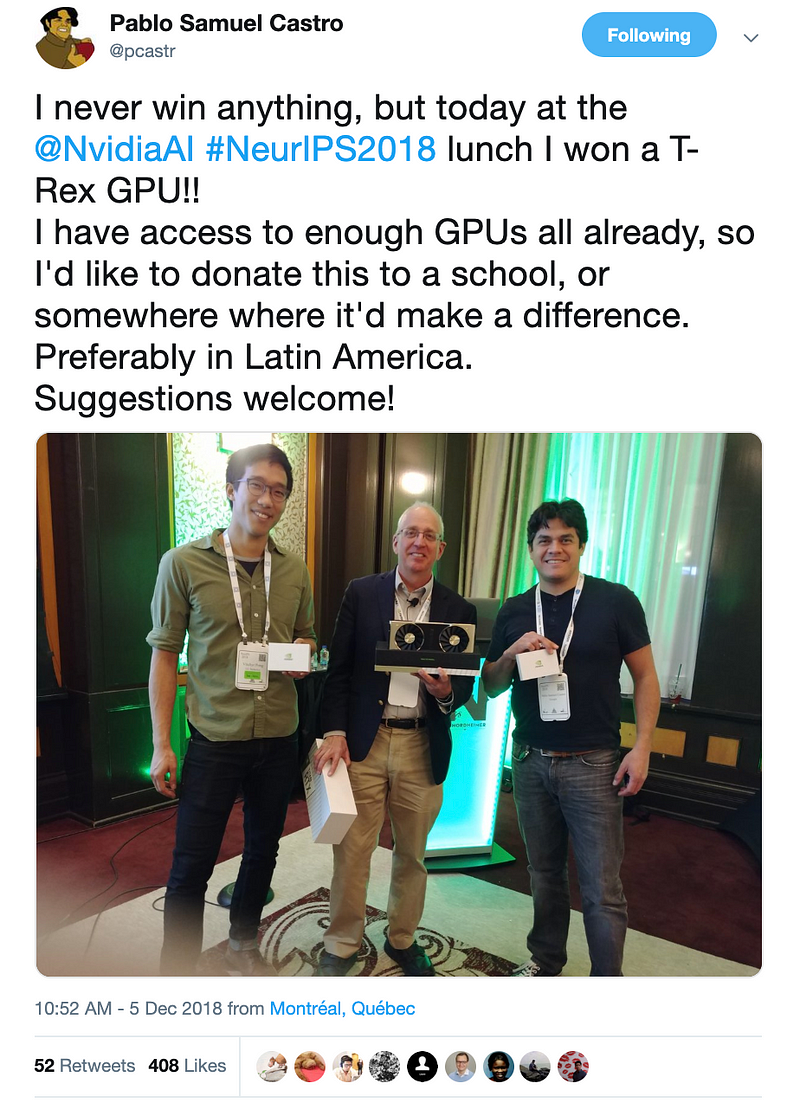
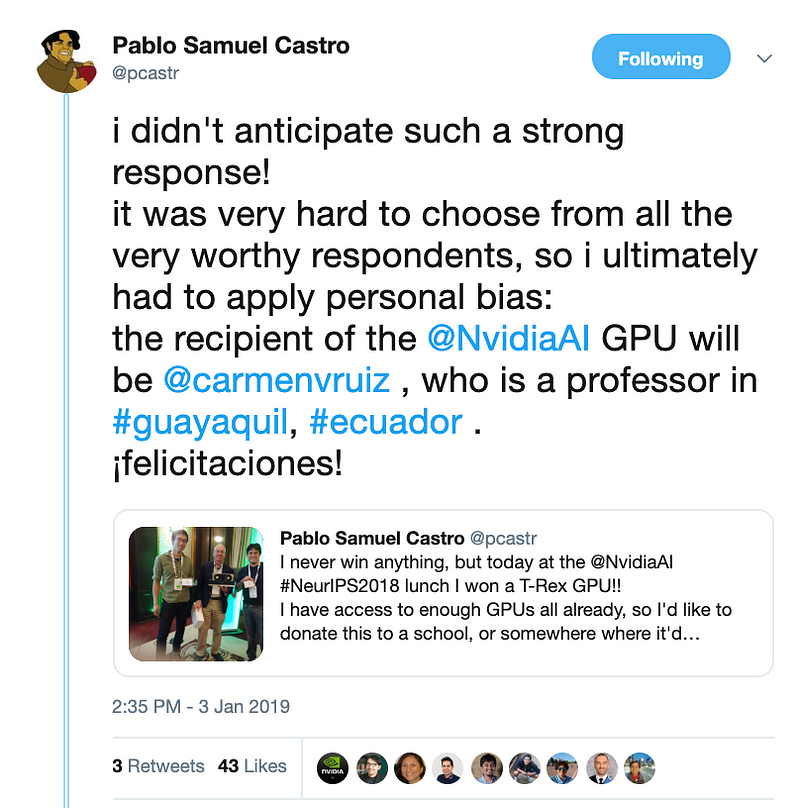
After deliberating over countless responses to his Twitter thread, Pablo ultimately found a great home for this Nvidia T-Rex GPU, gifting it to Carmen Ruiz, a Professor at the Higher Polytechnic School in Guayaquil, Ecuador, his home country. Carmen was chosen as the recipient thanks to her work leading a new Ph.D. program, and her research is being used for:
Natural disaster prediction and relief
Political analysis
Characterization of demographic groups in #Latam
VR for educating people in impoverished areas focused on girls
The next opportunity for us to rehome an incredible piece of hardware came during our recent partnership with Nvidia, where they hosted a scholarship for members of LatinX in AI and Black in AI to attend their annual GPU Technology Conference in March.
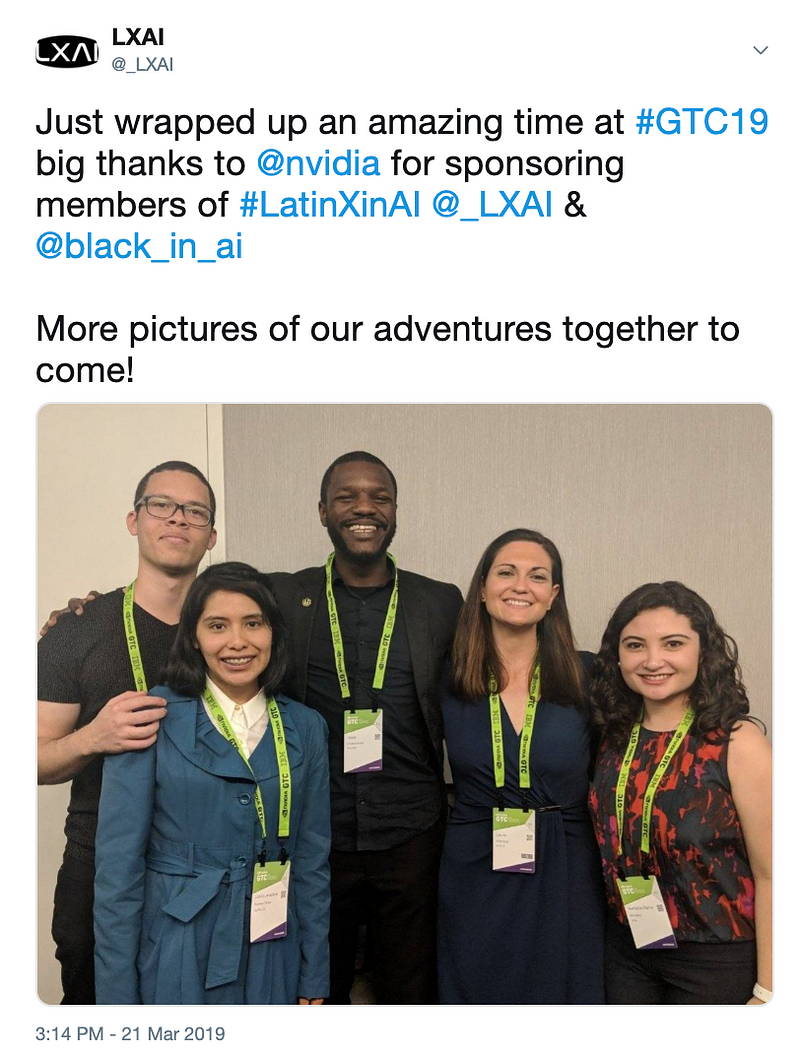
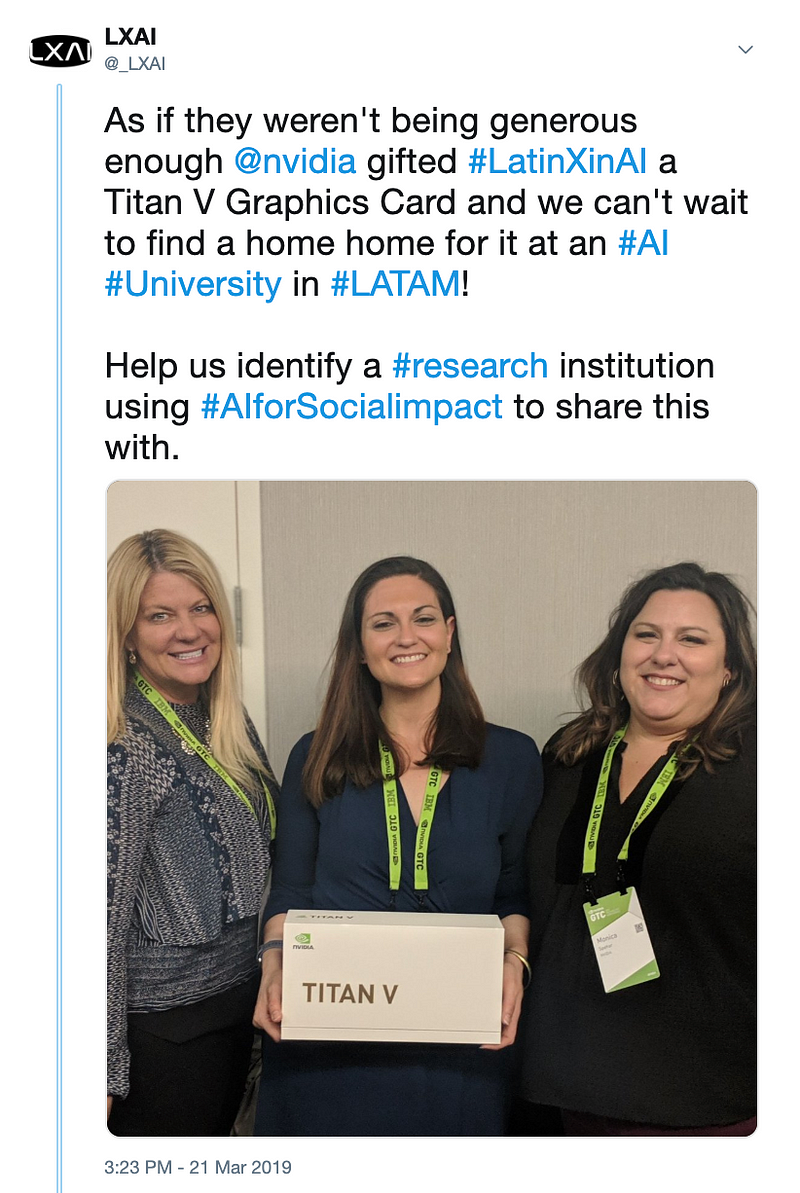
Nvidia graciously gifted our organization a second GPU, this time the Titan V, heralded to be the most powerful Volta-based graphics card ever created for the PC. This time, we took nominations from our community members, asking if they could help us identify research institutions and startups who could use additional computing power like this to boost their research initiatives. Specifically, we’re looking for those working on projects that provide a large societal impact or benefit to the local community.
After reviewing all the nominations in depth and researching potential issues with mailing and customs regulations — we chose and happily delivered the GPU to an AI research team at the Centro de Investigación y Desarrollo de Tecnología Digital del Instituto Politécnico Nacional in Mexico, nominated by Professor Jessica Beltran for their work on neurodegenerative diseases.
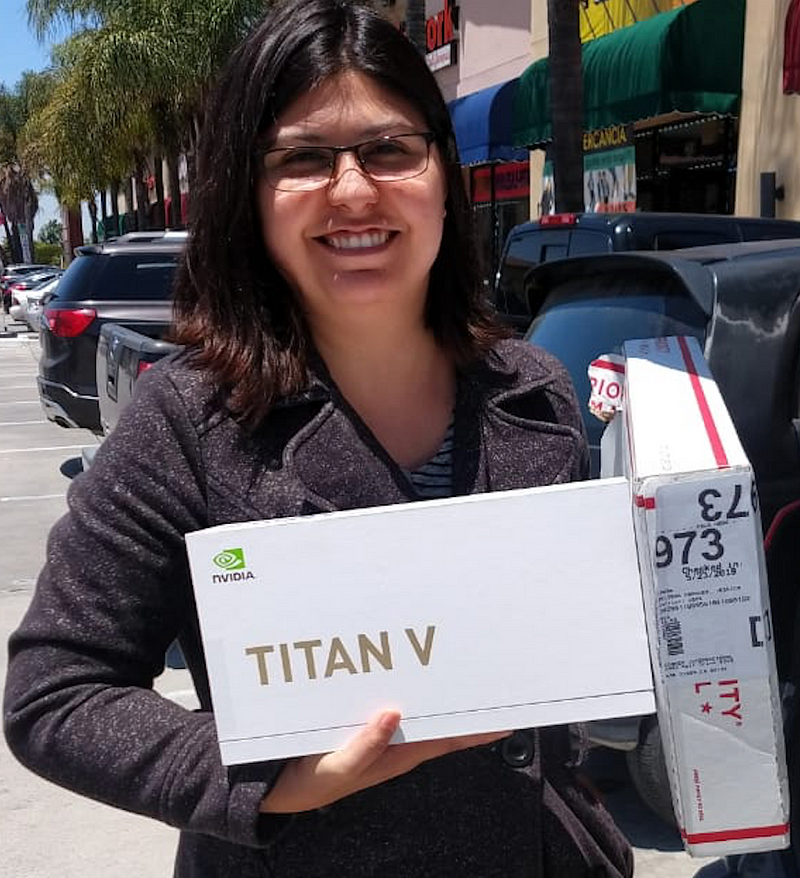
Dr. Jessica Beltran receiving the Titan V Graphics Card from Nvidia
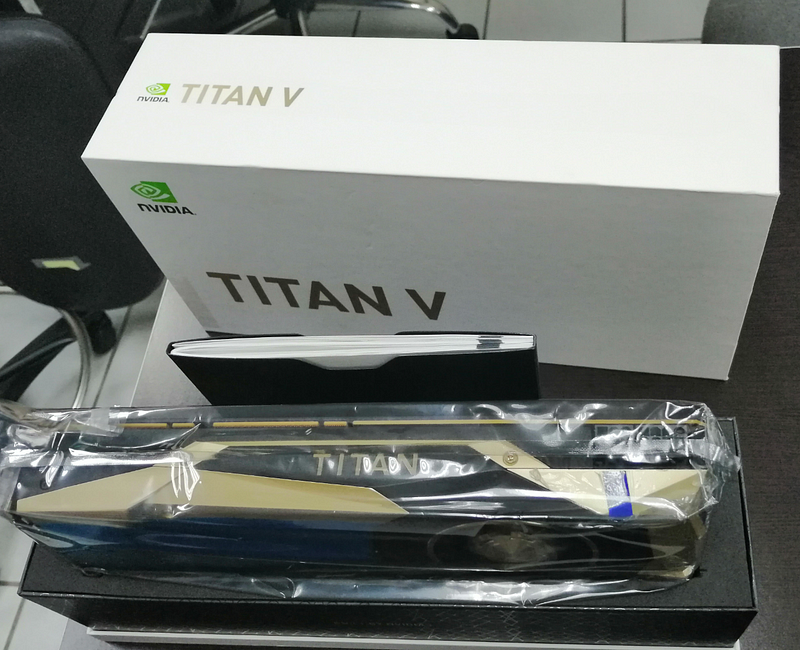
Unboxing the Titan V Graphics Card from Nvidia
We know their institution is going to do amazing work and we are excited to feature Dr. Jessica Beltran and her colleague Dr. Mireya Garcia on an upcoming online AI Research Discussion describing their work “Towards a Diagnoses of Alzheimer’s Disease with AI” on Friday, June 28th, 2019 at 11 am PST.

AI Research Discussion Webcast
In this talk, they will review current advances in eye movement analysis related to the diagnosis of Alzheimer’s Disease. We will discuss the challenges and future directions in this field. Additionally, they will show different projects related to AI that we conduct in their lab and research center (CITEDI-IPN, https://www.citedi.ipn.mx/portal/). These projects include pervasive healthcare and indexing of multimedia content
You can register to join us via webcast here: http://bit.ly/AI-Alzheimer-Webcast
To further our understanding and efforts in Latin America, it is imperative that we better understand the challenges and opportunities available to develop AI infrastructure across the continent. Can you help us by completing and sharing this quick survey, to better understand the key players, barriers, and opportunities for development and innovation in AI in your region?
LATAM AI Infrastructure Development Survey: http://bit.ly/LATAM-AI-Survey
LatinX in AI is continuing to take in-kind donations of new and gently used hardware or cloud computing credits to regift to research institutions and startups using AI to further their communities. Contact our board directly if you’d like to make a contribution: latinxinai @ accel.ai
Stay Up to Date with LXAI
Subscribe to our monthly newsletter to stay up to date with our community events, research, volunteer opportunities, and job listings shared by our community and allies!
Join our community on:
Facebook — https://www.facebook.com/latinxinai/
Twitter — https://twitter.com/_LXAI
Private Membership Forum — http://www.latinxinai.org/membership
